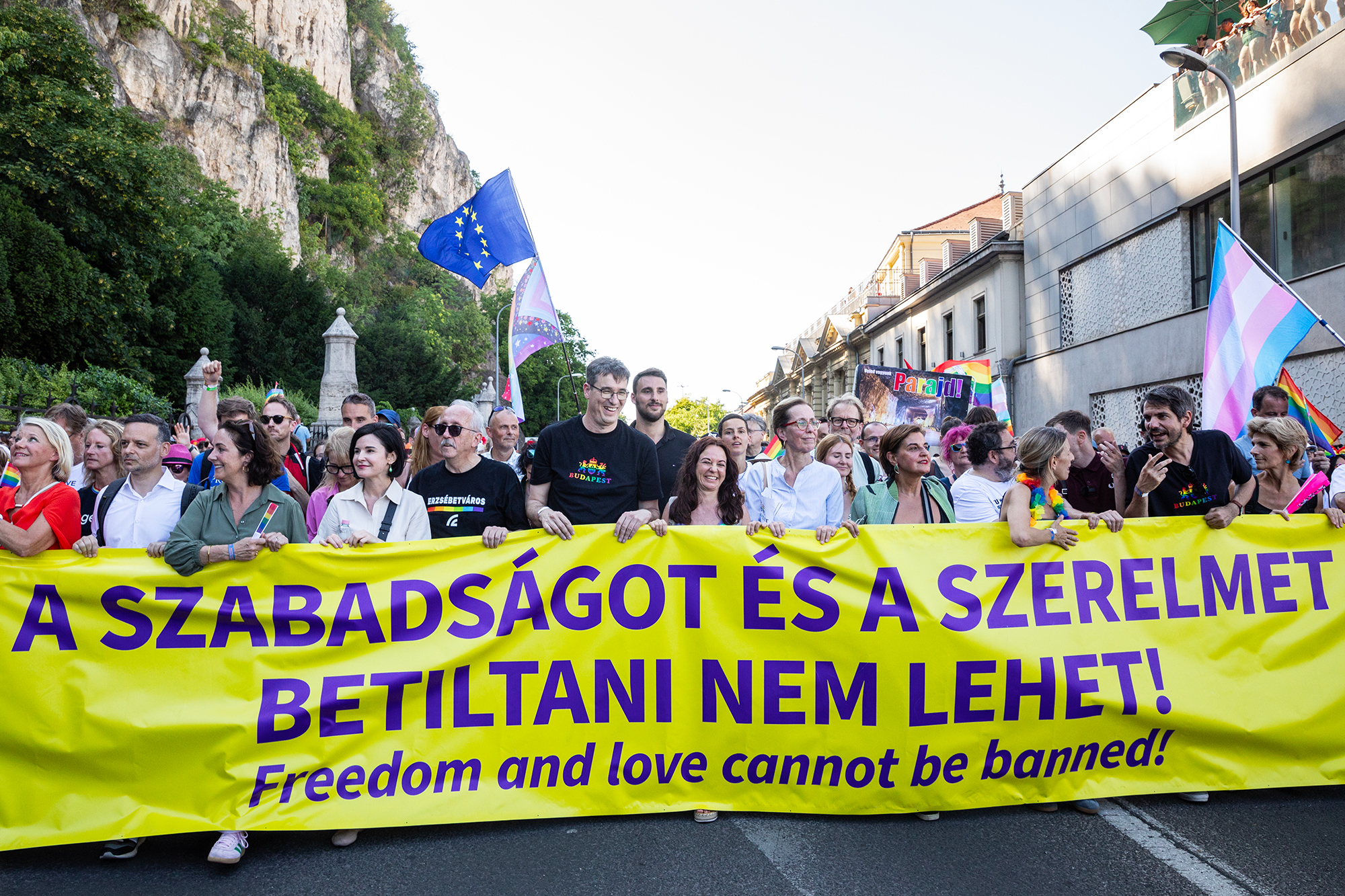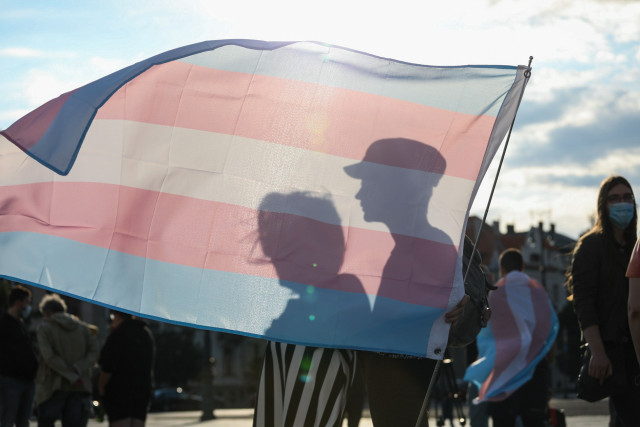Anti-LGBTQ disinformation in Hungary: who is behind it, what are its methods?
2025. október 27. 14:17
False or misleading statements targeting the LGBTQ community have become ordinary in mainstream pro-government media in Hungary. We present here the main themes and methods of those spreading disinformation.
Disinformation targeting LGBTQ people is a widespread phenomenon throughout Europe – no surprise that this is one of the topics (alongside the Russia-Ukraine war, climate change, and immigration) highlighted in the monthly summaries of the European Digital Media Observatory (EDMO), an organization that fights misinformation.
Ahead of the 2022 parliamentary elections, rhetoric attacking the LGBTQ community was an integral part of the campaign of Fidesz, the governing party of Viktor Orbán. The rhetoric was accompanied by numerous legal provisions, dubbed as "child protection measures". In 2020, the National Assembly passed a law preventing transgender people from changing their gender in official documents. In June 2021, the Parliament passed a "child protection law", restricting the portrayal of LGBTQ topics in front of minors. Later, authorities used this latter law to fine stores that displayed LGBTQ-themed books, and the police also tried to ban Budapest Pride 2025 on the basis of this law.
The government held a referendum on child protection simultaneously with the 2022 parliamentary elections. One of the questions asked was: "Do you support the promotion of gender reassignment treatments for minors?"
Anti-LGBTQ disinformation often attempts to reinforce, with the help of demonstrably false or misleading claims, government narratives, like that the public visibility of the LGBTQ community poses a threat to children.
In this article, we present the most important topics of disinformation attacking the LGBTQ community, illustrated with examples from Lakmusz's fact-checks published in recent years. We also examine who spreads these false or misleading claims and what methods they use to deceive.
The West and the "madness of gender reassignment surgeries"
One tool of anti-LGBTQ disinformation is the distortion and misinterpretation of Western countries' legislation and laws. Those who spread false claims try to create the impression that, unlike Hungary, Western governments are unable to "protect children."
A good example of this narrative came from János Halász, then spokesperson of the parliamentary faction of the ruling party, Fidesz, who in 2021 published a video statement entitled "We must put an end to the madness of gender reassignment surgeries!" as part of the anti-LGBTQ referendum campaign. Halász claimed that
"The recognition of gender reassignment surgeries and interventions has appeared in several Western European countries, including Spain, where minors can change their gender without parental consent from the age of 14. Also in Scotland, where the same is already permitted from the age of 4."
In reality, the legislation in Spain, which was only a proposal at that time, did not refer to gender reassignment surgery at all, but to the possibility for young people aged 14 and over to initiate a legal gender change – which means to change their gender in official documents. In Scotland, the reference to four-year-olds comes from a government guideline suggesting that teachers should let children use names and pronouns consistent with their gender identity in the classroom.
When the Spanish law was passed in 2023, the Danube Institute, a right-wing, conservative think tank with significant government support, revived the issue on the institute's blog, stating that
"Spanish law allows children as young as 12 to undergo gender reassignment surgery."
However, the Spanish law only regulates legal gender change: between the ages of 12 and 14, gender can be changed in official documents with special court permission.
In addition to Western Europe, the United States has also become a target of misinformation about gender reassignment. During the US presidential election campaign, one day after Kamala Harris announced that her running mate would be Tim Walz, who has been governor of Minnesota since 2019, the pro-government outlet Magyar Nemzet claimed that Walz had "enacted the possibility of gender reassignment for minors."
This is another case of misinterpretation of the law.
In fact, in 2023, Walz first signed an executive order and then a law confirming the right to gender-affirming care. These treatments were already legal in Minnesota, the new legislation was only a response to several other US states restricting or banning gender-affirming care. The documents signed by Walz said nothing about the age at which such treatments can be provided. On this issue, Minnesota healthcare providers follow national and international health recommendations and guidelines.
Questioning the gender identity of public figures
A frequent tactic in anti-LGBTQ narratives is to discredit female public figures — such as politicians and athletes — by questioning their gender identity. This form of disinformation targeting women attacks them by claiming that they were „actually born male”.
At Lakmusz, we have repeatedly examined such claims — including false allegations that Algerian boxer Imane Khelif or French First Lady Brigitte Macron are transgender.
Imane Khelif's 2024 Olympic victory was overshadowed by the controversy surrounding her gender identity. Although the International Boxing Association (IBA) did indeed disqualify Khelif from the 2023 World Championships on the basis of a chromosome test, we explained in our article that Khelif is registered as a woman by the Algerian authorities. Since legal gender reassignment is not possible in Algeria, the athlete was most likely registered as a woman at birth. Therefore, even if she indeed has XY chromosomes – typically associated with men – the most plausible explanation is that she is intersex, not transgender.
Nevertheless, a misleading video that went viral during the Olympics attempted to prove that the boxer considers herself a man. According to the video, Khelif said on a TV show that
"In 2017, we were little boys"
and that "I was seen as a future Olympic champion... I am an Algerian soldier" (using the masculine forms of the words ‘champion’ and ‘soldier’).
The edited video was shared in Hungary by several government-aligned figures, such as Zsolt Bede, who is associated with Vadhajtások, and Szerző Öcsi (now Lipsisimogató Plüssbalta), a site linked to the pro-goverment influencer group Megafon.
The footage had been cut from a 52-minute interview recorded in 2022. In our fact-check, based on the opinions of two Arabic-speaking journalists and Zoltán Szombathy, head of the Department of Semitic and Arabic Studies at Eötvös Loránd University, we wrote that in the original video, Khelif simply referred to herself and her friend as "kids," not "little boys." Although it is true that the words "champion" and "soldier" were used in the masculine form in the interview, Khelif was referring to the concept of "Olympic champion" in general when she used the word "champion". The masculine form of "soldier" does not imply that she was referring to herself as a man.
In 2021, a conspiracy theory began to spread about Brigitte Macron, the First Lady of France, claiming that she was transgender.
According to the theory, Brigitte Macron (born Brigitte Trogneux) was born a man named Jean-Michel Trogneux, underwent gender reassignment surgery, and then took the name Brigitte (Jean-Michel Trogneux is actually Brigitte Macron's brother).
In 2024, the American political commentator Candace Owens revived and spread this theory to an even wider audience. Through Owens, the story entered the Hungarian public sphere, where, for example, the pro-government Pesti Srácok and the Russian propaganda outlet Orosz Hírek reported on the conspiracy theory without criticism. In 2022, Owens was a guest speaker at the Conservative Political Action Conference (CPAC) in Budapest, opened by Viktor Orbán.
One of the latest versions of the Brigitte Macron theory was a fake news story claiming that in June 2025, a French surgeon — who allegedly had proof of Macron’s gender transition — fell out of the window of his Paris apartment and died.
The claim originated from a recently created website that misused the identities of French journalists. In Hungary, it was again spread by Zsolt Bede, among others.
The fake news was accompanied by a 90-second video disguised as a news report about the surgeon's alleged accident. The footage was manipulated: it combined clips from a crime scene investigation in Paris from 2022, with AI-generated segments showing the alleged surgeon and his sister. The use of AI was evident from unnatural eye movements, odd skin and hair textures, and distorted backgrounds.
In reality, there is no evidence of the death of the surgeon, named in the report as François Faivre, and no reliable source confirms his existence. When AFP's fact-checking site contacted the hospital mentioned as his workplace, the hospital denied that a surgeon with that name worked there.
A further twist to the Brigitte Macron conspiracy came after a French court ruling in July 2025, which acquitted two women accused of defamation for calling the First Lady transgender.
Many in the Hungarian public discourse misinterpreted the ruling. In a video by Ripost, a government-aligned outlet, the verdict was described as follows
"The court has acknowledged that it cannot be ruled out that the women's theory is true, and that Brigitte Macron is in fact a man."
Other government media outlets did not make such specific statements, but rather suggested in their headlines that the verdict indicated that there might be some truth to the conspiracy theory.
In fact, the court did not confirm or validate any claims about Brigitte Macron’s alleged transgender identity. The veracity of the statements was not even examined in the proceedings.
Through the legal fact-checking platform Les Surligneurs, Lakmusz obtained the court’s decision, which clearly states that the acquittal was based solely on legal grounds: the judges ruled that calling Brigitte Macron transgender did not meet the definition of defamation, as it did not harm her honor or reputation – not because the claims were considered true.
Misleading presentation of EU and other grants
The government’s anti-EU and anti-LGBTQ rhetoric often incorporates misleading information about EU funding, suggesting that the EU provides far greater financial support to LGBTQ organizations than it actually does.
Balázs Orbán, the Prime Minister's political director restricted a major EU funding program promoting fundamental values to "gender sensitization" when he said in a video posted on his Facebook page this summer:
"Hadja Lahbib (...) came to inform the public (...) that €1.5 billion, or 600 billion HUF, of European taxpayers' money is available for awareness campaigns similar to the gender sensitization seen at this weekend's Pride event."
He made this claim after EU Commissioner Hadja Lahbib gave a speech at a press conference held ahead of the 2025 Budapest Pride. Lahbib did indeed mention an EU program with a budget of 1.5 billion euros. However, she was referring to the Citizens, Equality, Rights and Values (CERV) program, which has been running for years. CERV aims to strengthen the EU's core values, such as equality, civic participation, and inclusion of disadvantaged groups, primarily through support for civil society organizations and local governments.
Following Balázs Orbán's video, numerous articles appeared in the government media about the €1.5 billion in funding, presenting the program as
- billions of euros spent on gender campaigns,
- the EU’s billion-euro support for LGBTQ propaganda,
- or funding for organizations promoting gender ideology.
While CERV funding does include initiatives promoting equality for LGBTQ people, this represents only a small fraction of the total budget of 1.5 billion euros. Of the 160 organizations supported in Hungary, only five deal specifically with LGBTQ issues as their main activity, and these have received a total of 630,000 euros (approximately 250 million HUF) since 2021.
Furthermore, it is not only civil society organizations that have received CERV funding, but public institutions like the Ministry of Interior or the National Authority for Data Protection and Freedom of Information.
In addition to the European Union’s programs, one of Budapest’s LGBTQ support programs was also attacked with misleading information by pro-government actors.
In March 2025, Gergely Huth, editor-in-chief of Pesti Srácok, claimed on ATV that:
"With the support of Gergely Karácsony (mayor of Budapest), intimacy coordinators are helping to organize homosexual parties and orgies."
Although other pro-government media outlets did not specifically use the term "intimacy coordinator”, they also reported that the city council spent millions on so-called sober participants in chemsex parties. Outlets such as Mandiner and Magyar Nemzet also amplified this claim.
The claim about sober participants sent to chemsex parties with money from the municipality of Budapest is based on a statement made three years ago by an employee of Háttér Society, a civil organization dedicated to protecting the rights of LGBTQ people. This claim was distorted and conflated with a grant that Budapest awarded to the organization last year.
In the summer of 2024, Budapest provided 3.4 million HUF in funding for Háttér Society’s drug prevention and harm reduction program, which in fact has nothing to do with intimacy coordinators participating in homosexual orgies. The project does not facilitate the organization of chemsex events, but focuses on reducing the risks for participants.
The statement about sober participants was made at a conference held in January 2022, where a member of the Háttér Society spoke about foreign examples of chemsex party organizers providing a sober participant to look after the others. However, he did not mention this as part of their own program. He also confirmed to Lakmusz that providing sober participants is not part of any of their programs.
One research grant given by the Biden administration in the US was also misrepresented by anti-LGBTQ disinformation, including in Hungary. In March, following a statement by the US Secretary of Agriculture, the Hungarian News Agency (MTI) claimed that a project entitled "Research on the menstrual cycle of transgender men" had received 600,000 dollars in funding under the Biden administration. András Bencsik, editor-in-chief of Demokrata, wrote on his Facebook page that Joe Biden had launched a 600,000 dollar program to "study the menstrual cycles of transgender men."
In reality, this was not the title of the research program, and its objectives did not mention research on the menstrual cycles of transgender men. The grant was aimed at developing sustainable, reusable, and less harmful feminine hygiene products, instead of the usual products made from processed synthetic materials.
The project description mentioned transgender men only once, merely noting that they can also menstruate, since a person born female who identifies as male does not automatically cease to have a menstrual cycle.
Misleading reports and fake news about Pride
The spread of misinformation about the LGBTQ community intensifies every June, in the Pride Month, usually ending with the Budapest Pride march. This year, the topic received even greater emphasis in government communication and pro-government media, as the Hungarian government amended the Assembly Act in mid-March to prevent the Pride parade from taking place.
Ultimately, on June 28, the municipality of Budapest organized the event, and the largest crowd in the history of the parade in Hungary marched through downtown Budapest.
The government and its media portrayed the Budapest Pride march as "banned," and the Minister of Justice, Bence Tuzson falsely claimed that the Supreme Court itself had banned the event – when in reality the Supreme Court's decision referred not to the municipality’s Pride march, but to a different LGBTQ event.
During the weekend when the Pride march took place, manipulative reports appeared that sought to discredit the parade, the LGBTQ community, and the mayor of Budapest, Gergely Karácsony, who had taken responsibility for organizing Budapest Pride.
These reports used a variety of techniques:
- they conflated news about the parade with news that were unrelated or only loosely connected to the Budapest Pride,
- they presented photos from past events as if they had been taken at this year's march,
- they tried to discredit Gergely Karácsony because of a single gesture taken out of context,
- they spread fake news about an Italian Pride march.
On the day of the parade, several pro-government media outlets used the tactic of reporting on events that were completely unrelated or only tangentially connected to Budapest Pride as if they were closely related to the event.
For example, Origo and HírTV linked a police report about a man who had masturbated in the city center on a public bench near a playground, to Pride. HírTV’s report also suggested that the man had participated in the parade, even though the indecent exposure had nothing to do with Pride. The same thing happened in another news story, when Origo reported on the case of a woman who disappeared from the 8th district of Budapest, as if her disappearance and the parade were related.
Origo illustrated one of its articles about the parade with an old photo showing a Hungarian drag queen who had died 10 years ago.
Even Balázs Orbán, the Prime Minister’s political director, shared misleading images: he posted about this year’s Pride on social media, but illustrated his post with photos from the event from 2021.
An article in Magyar Nemzet attempted to undermine the general perception of Pride by spreading fake news about an Italian parade. They claimed that “Jews were banned from the Milan Pride.” It quickly became clear that Italian newspapers had not written about Jews being banned from the march, but about the leader of a specific Jewish organization deciding not to participate in the Milan parade.
Articles published in pro-government media outlets sought to discredit not just the Pride parade itself but also the organizers. They claimed that Gergely Karácsony had given a Nazi salute on stage when addressing the crowd gathered at Pride. They referred to a post by Dutch far-right politician Geert Wilders. Wilders shared a snippet cut from a video recording of the mayor's speech, in which Karácsony is seen raising his hand.
However, if we watch the whole video, we can see that the sequence was chosen in a manipulative way, as the mayor did nothing more than raise his hand and say that members of the government "have no power over us."
When the question arises in the state media whether homosexuality can be cured
In its communication, the Hungarian government usually links anti-LGBTQ narratives with the promotion of the traditional family model. This also happens when articles appear in pro-government media defending so-called "conversion" or "reparative" therapies aimed at changing sexual orientation. While performing such therapies by psychologists is considered an ethical violation in Hungary, pro-government media outlets and organizations are at the forefront of promoting these therapies and portraying them in a positive light.
They do this using well-known methods of spreading misinformation, such as:
- they cite pseudo-scientific and unfounded research to prove the effectiveness of the therapies, without presenting the concerns and arguments of scientific and professional organizations against such practices,
- they reinforce the view that homosexuality is a disease and that those who seek therapy are patients seeking a cure,
- they try to appeal to emotions by presenting personal stories, often referring to religion.
The narrative of describing homosexuality as a disease is not new in the Hungarian pro-government media. One of the most memorable examples is a program broadcast on the public television channel M5 in 2019, where it was discussed how homosexual people could be cured. The program began by posing the following questions:
"Condition? Illness? Deviation? Or just the much-discussed otherness?"
These questions are also frequently discussed on several other channels, such as Hetek, where we can read about therapies aimed at changing an individual's sexual orientation, or Axióma, where homosexuality is referred to as "unwanted attraction," and where a leader of a movement talked about how she "lived as a lesbian before her conversion" in an interview.
In 1973, the American Psychiatric Association (APA) removed homosexuality from the Diagnostic and Statistical Manual (DSM), meaning that it has not been considered a mental illness since then. In 1990, the World Health Organization (WHO) also removed homosexuality from its International Classification of Diseases.
Articles in pro-government newspapers usually refer to Joseph Nicolosi, an American clinical psychologist, considered to be the “father” of conversion therapy. The organization he founded provides the "scientific" background for the therapy, for example by publishing the Journal of Human Sexuality, which regularly features studies supporting Nicolosi's theory.
Although Nicolosi died in 2017, his son continues his father's work. The "scientific basis" supporting his theory includes studies published in the journal of the organization founded by his father. Those studies regularly appear in Hungarian articles on the subject. Pro-government media articles do not mention the numerous scientific arguments against conversion therapies, nor do they publish the opinions of professionals who oppose these theories or consider them harmful.
However, there are also opposing views: according to a UN report, conversion therapies "inflict severe pain and suffering and result in psychological and physical damage." The British Royal College of Psychiatrists writes that both nature and nurture play a role in the development of sexual orientation, and there is no scientific evidence that it can be changed.
It is no coincidence that conversion therapies have been banned in several countries around the world. There is a total ban in 17 countries, eight of which are members of the European Union.
Articles on conversion therapy in pro-government media feature numerous psychologists, mental health professionals, journalists, and religious figures. These people also participate in conferences promoting conversion therapy, sign petitions against banning conversion therapy, or convey beliefs similar to those of the conference organizers'. Moreover, they are closely connected to each other and have multiple ties to pro-government organizations.
This article was written as part of the Prebunking at Scale project, with support from the European Fact-Checking Standards Network.
Cover photo: Bankó Gábor/444
A szerzőkről

Balogh Boglárka
Egyetemi tanulmányait a BGE kommunikáció- és médiatudomány alapszakán végezte. 2024 júliusában gyakornokként csatlakozott a Lakmuszhoz, 2025 októberétől dolgozik teljes állású újságíróként. 2024 novemberétől egy éven át Thomson Alapítvány nemzetközi gyakornoki programjának résztvevője volt.

Fülöp Zsófia
2023 májusától a Lakmusz újságírója, korábban 9 évig a Magyar Narancsnál dolgozott, főként egészségügyről, szociális ügyekről és marginalizált csoportokról írt. Az oxfordi Reuters Institute ösztöndíjasaként a romák médiareprezentációját kutatta.
Kövess minket!
Ne maradj le egy anyagunkról sem, kövess minket máshol is!



